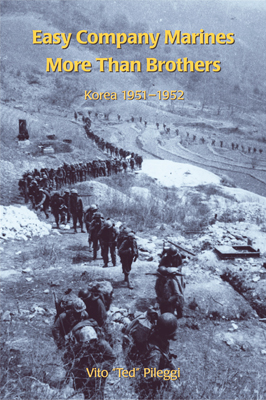
Now shipping:
Easy Company Marines
|
|
Fourth Edition – additional photos 328 pages, 6 x 9 inches 94 black & white photos Trade paperback, eBook Paper: ISBN 978-0-9830292-1-2 ebook: ISBN 978-0-9830292-2-9 Easy Company Marines—More Than Brothers is a story about young men who fought in the Korean War during the years of 1951 and 1952. The author was one of those young men. “I think it is probably one of the best war stories I have ever read ... Thanks again for giving me just a few more minutes with my Dad.” —Willie Schlei, Jr. |

Available now as paperback here,
and as paperback and ebook at Amazon.com and in Europe:
|
|
|
|
|
|
The oldest of six children born to Ethel and Elmer Pileggi, Vito was raised in rural Oregon on a small farm and attended schools near Sherwood. After serving one three-year enlistment in the Marines Corps and attaining the rank of sergeant, he entered the Oregon State Police, employed as a patrol officer. After serving three years with the State Police in Astoria and Tillamook, the author re-enlisted in the Marines, retaining his old rank as sergeant. A year later he was stricken with polio and was eventually discharged from the service. The State Police rehired him even though his right arm and shoulder were severely restricted by the disease. He was assigned to communications in the Eugene Patrol Office for eight years, after which he transferred to the State Police Identification Bureau as a fingerprint technician in Salem. Before retiring at the rank of lieutenant, the author supervised the Oregon State Police data processing section. Throughout the years he has been very active as a singer and board member with Festival Chorale Oregon, a regional concert choir of approximately one hundred professional and amateur singers. The author has coordinated performance tours for the Chorale throughout mainland Europe and Carnegie Hall in New York. He currently lives in Stayton, Oregon, was married and has five children: Stephen, Thomas, Angela, Richard and Joseph. “I was one of those young men. Our personalities are revealed through the hardships we endured fighting a determined, cunning enemy in unbearable weather. Most of us survived but, unfortunately, some of us died. The story recounts attacks on unnamed hills, our defensive positions during the peace talks, and the numerous patrols and ambushes that we prosecuted as well as the ones we repulsed. There are suspenseful moments, dreadful moments, moments of calm, and even moments of humor. Trusting my memory and that of many others who were in Korea, I have recorded the events in this story as accurately as possible. Only small amounts of dialogue can be remembered with any precision but the conversations in this writing reflect what happened at the time. There is no reason for me to believe that the anecdotes related to me by others are not true. The story begins with my enlistment in the Marine Corps and the rigors of boot camp and combat infantry training. It continues with life aboard a troop ship and my assignment to Easy Company, Second Battalion, Seventh Marine Regiment of the First Marine Division. It describes my reactions and feelings at seeing dead people for the first time in my life, and seeing people, both enemy and friends, being killed. Several paragraphs are dedicated to individual men and their experiences. The story is from the personal viewpoint of a young Marine who had no idea where he was or what was happening. It is about actual combat, moments of fear, feelings and dreams, the reality of death, despair and relief.” —Vito “Ted” Pileggi |